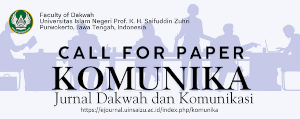PENGETAHUAN ILMIAH DAN KEBENARAN DALAM ILMU KOMUNIKASI
DOI:
https://doi.org/10.24090/komunika.v6i2.361Keywords:
pengetahuan ilmiah, kebenaran, ilmu komunikasiAbstract
Human beings have a high curiousity that leads them to produce knowledge that willhelp them to solve their problems. Their curiousity continues to exist although they have beenable to solve their problem. Through this process, the production and reproduction ofknowledge continues to exist.From the academic perspective, the answer to the curiousity of human beings areaccepted and acknowledged when it is scientifically accepted. This leads to determine the trueand false knowledge. The true knowledge are achieved when it has scientific standards ofknowledge.This article discussed the scientific truth in knowledge, especially communicationstudy which is developing rapidly. As a new science, communication study has some criteriaand measurement of truth which have some differences with other social sciences. However,communication study is really a part of social science that makes human being as its mainstudy.Downloads
Download data is not yet available.
Downloads
Issue
Section
Articles
License
Authors who publish with this journal agree to the following terms:
- Authors retain copyright and grant the journal right of first publication with the work simultaneously licensed under a Creative Commons Attribution-ShareAlike 4.0 International License that allows others to share the work with an acknowledgement of the work's authorship and initial publication in this journal.
- Authors are able to enter into separate, additional contractual arrangements for the non-exclusive distribution of the journal's published version of the work (e.g., post it to an institutional repository or publish it in a book), with an acknowledgement of its initial publication in this journal.
- Authors are permitted and encouraged to post their work online (e.g., in institutional repositories or on their website) prior to and during the submission process, as it can lead to productive exchanges, as well as earlier and greater citation of published work (See The Effect of Open Access).
























